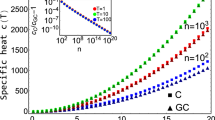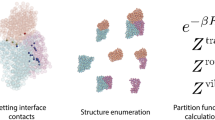Abstract
As a part of a fundamental research programme it became necessary to investigate spatial relationships in a three-dimensional assembly of particles. Since computing time has become more readily available, there have been a number of reports on work dealing with this topic. However, these have concentrated mainly on flocculated or close-packed models. Typical studies are those of Hutchinson and Sutherland1, Levine and Chernick2 and Alder, Frankel and Lewinson3. In contrast the simple model chosen as the basis for this computer study was as follows.
This is a preview of subscription content, access via your institution
Access options
Subscribe to this journal
Receive 51 print issues and online access
$199.00 per year
only $3.90 per issue
Buy this article
- Purchase on Springer Link
- Instant access to full article PDF
Prices may be subject to local taxes which are calculated during checkout
Similar content being viewed by others
References
Hutchinson, H. P., and Sutherland, D. N., Nature, 206, 1036 (1965).
Levine, M. M., and Chernick, J., Nature, 208, 68 (1965).
Alder, B. J., Frankel, S. P., and Lewinson, B. A., J. Chem. Phys., 23, 3 (1955).
Author information
Authors and Affiliations
Rights and permissions
About this article
Cite this article
CRAKER, W., RAY, W. A Computer Study of the Grouping of Spheres in a Random Three-dimensional Assembly. Nature 211, 509–511 (1966). https://doi.org/10.1038/211509a0
Issue Date:
DOI: https://doi.org/10.1038/211509a0
Comments
By submitting a comment you agree to abide by our Terms and Community Guidelines. If you find something abusive or that does not comply with our terms or guidelines please flag it as inappropriate.



